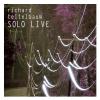RICHARD TEITELBAUM

ABOUT THE ARTIST/BIOGRAPHY
Composer/performer RICHARD TEITELBAUM is well known for his pioneering work in live electronic music, and his early explorations of intercultural improvisation and composition. He received his masters degree in theory and composition from Yale in 1964. After continuing his composition studies with Luigi Nono on a Fulbright in Italy, he co-founded the pioneering live electronic music group Musica Elettronica Viva (MEV) with Frederic Rzewski and Alvin Curran in Rome in 1966, bringing the first Moog synthesizer to Europe the following year.
He returned to the United States in 1970 to create the World Band, one of the first intercultural improvisation groups which was made up of master musicians from India, Japan, Korea, the Middle East and North America. His works since then have frequently combined live electronics with the music of other cultures. In 1977 he spent a year in Tokyo, studying shakuhachi (bamboo flute) with the great master Katsuya Yokoyama.
He has performed his works at Berlin's Philharmonic Hall, the Concertgebouw in Amsterdam, Almeida Theater and South Bank in London, the Pompidou Center in Paris, the Kennedy Center in Washington, and in concerts and festivals throughout Europe, North America, East Asia and Latin America. He has been commissioned by leading performers, including pianists Aki Takahashi and Ursula Oppens. His many recordings include: Golem: an Interactive Opera, on Tzadik; The Sea Between with Carlos Zingaro, on Victo; Live at Merkin Hall with Anthony Braxton on Music and Arts; Concerto Grosso, for Human Concertino and Robotic Ripieno, on Hat Art; and Spacecraft with Musica Elettronica Viva, on Alga Marghen.
Teitelbaum is also a Professor of Music at Bard College, in upstate New York, where he teaches electronic and experimental music, and co-chairs the music department of the Master of Fine Arts program. Back to Artists
LINKS
http://inside.bard.edu/teitelbaum/


